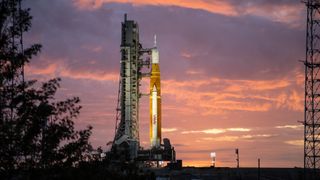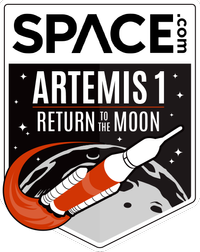

It's official: NASA will indeed try to launch its Artemis 1 moon mission this weekend.
After a meeting today (Sept. 1), the Artemis 1 team gave the go-ahead to proceed with a liftoff attempt on Saturday (Sept. 3) from NASA's Kennedy Space Center in Florida. The highly anticipated launch is scheduled to occur during a two-hour window that opens at 2:17 p.m. EDT (1817 GMT); you can watch it live here at Space.com when the time comes.
"There's no guarantee that we're going to get off on Saturday, but we're gonna try," Artemis mission manager Mike Sarafin said during a news conference this evening (Sept. 1).
Related: NASA's Artemis 1 moon mission: Live updates
More: NASA's Artemis 1 moon mission explained in photos
Artemis 1 will use a Space Launch System (SLS) rocket to send an uncrewed Orion capsule on a 37-day mission to lunar orbit and back. It will be the first mission for the SLS and for NASA's Artemis program, which aims to establish a sustainable human presence on and around the moon by the late 2020s.
Artemis 1 was originally supposed to lift off on Monday morning (Aug. 29), but the mission team noticed a problem during the countdown: One of the four RS-25 engines that power the SLS core stage wasn't cooling down to the proper prelaunch temperature. Such thermal conditioning, achieved by "bleeding" supercold liquid hydrogen propellant into the RS-25s, helps prevent a shock when the engines ignite, NASA officials have explained.
The Artemis 1 team couldn't troubleshoot the issue before the launch window closed, so Monday's attempt was called off.
Get the Space.com Newsletter
Breaking space news, the latest updates on rocket launches, skywatching events and more!
Further analysis over the next day or so suggested that the issue wasn't a major one; the evidence pointed to a faulty temperature sensor in the affected RS-25 engine, team members said during a news conference on Tuesday evening (Aug. 30). They expressed confidence that Artemis 1 wouldn't be grounded for long, identifying Saturday as the next launch target.
Two more days of work and consultation have firmed up that conclusion, mission team members announced during this evening's news conference.
"We have convinced ourselves without a shadow of a doubt that we have good, quality liquid hydrogen going through the engines. There's no fuzz on that," said John Honeycutt, manager of the SLS program at NASA's Marshall Space Flight Center in Alabama. "We know we had a bad sensor."
Replacing the sensor would likely require rolling Artemis 1 off the launch pad and back to Kennedy Space Center's huge Vehicle Assembly Building. The team doesn't think that's necessary or desirable, so they plan to leave the sensor in place and ignore its faulty readings on launch day, NASA officials said this evening.
The Artemis 1 team also looked at several other issues that cropped up during Monday's countdown, including a slight hydrogen leak and a crack in the foam that's part of the SLS core stage's thermal protection system. The leak has been fixed, team members said this evening. And the foam crack requires just "incremental risk acceptance," as does the engine sensor issue.
"We're comfortable with our flight rationale and risk acceptance there," Sarafin said.
Something else could keep Artemis 1 on the ground Saturday — the notoriously fickle Space Coast weather. But things look good for a launch try on Saturday; Melody Lovin, weather officer with the U.S. Space Force's Space Launch 45 group, said during this evening's briefing that there's a 60% chance of good conditions when Saturday's window opens.
If Artemis 1 can't fly on Saturday, the next opportunity will come on Monday (Sept. 5), mission team members said. And the weather looks promising on that day as well, according to Loving.
"Basically, the weather looks good," she said. "I wouldn't be shocked if there are periods where we are technically red for weather. But the bottom line is that I don't expect weather to be a showstopper for either launch window."
Mike Wall is the author of "Out There" (Grand Central Publishing, 2018; illustrated by Karl Tate), a book about the search for alien life. Follow him on Twitter @michaeldwall. Follow us on Twitter @Spacedotcom or on Facebook.
Join our Space Forums to keep talking space on the latest missions, night sky and more! And if you have a news tip, correction or comment, let us know at: community@space.com.

Michael Wall is a Senior Space Writer with Space.com and joined the team in 2010. He primarily covers exoplanets, spaceflight and military space, but has been known to dabble in the space art beat. His book about the search for alien life, "Out There," was published on Nov. 13, 2018. Before becoming a science writer, Michael worked as a herpetologist and wildlife biologist. He has a Ph.D. in evolutionary biology from the University of Sydney, Australia, a bachelor's degree from the University of Arizona, and a graduate certificate in science writing from the University of California, Santa Cruz. To find out what his latest project is, you can follow Michael on Twitter.
Most Popular

